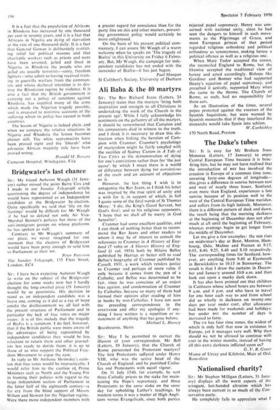Bridgwater's last chance
Sir: My friend Auberon Waugh (31 Janu- ary) rather missed the point Barry Cox and I made in our Sunday Telegraph article questioning the degree of independence he would have represented as an Independent candidate at the Bridgwater by-election. Quite specifically we said that 'life on the hustings' would be difficult for Mr Waugh if he had to defend not only Air Vice- Marshal Bennett's policies but those of the anti-immigrant groups on whose platforms he has spoken as well.
Contrary to Mr Waugh's summary of our piece, we never imagined for one moment that the electors of Bridgwater would have been potty enough to send him to Parliament as their MP.
Peter Paterson
The Sunday Telegraph, 135 Fleet Street, London, EC4
Sir: I have been expecting Auberon Waugh to write on the subject of the Bridgwater election for some weeks now but I hardly thought the long-awaited piece (31 January) would be so pessimistic. His decision to stand as an independent candidate was a brave one, coming as it did as a ray of hope ' amidst the disillusionment we all feel with the present structure of Parliament and in particular the lack of free votes on major issues: it is of this malady that the tragedy of Biafra is a symptom. I do feel, however, that if the British public were more aware of the advantages of being represented by independent candidates they would be less reluctant to return them and other journal- ists less ready to deride them; it is up to those of us who support the Political Free- dom Movement to argue the case.
In reply to Mr Anthony Shrimsley's opin- ion that free votes would be impracticable, I would refer him to the caution ot Prime Ministers such as North and the Young Pitt in framing their policies with regard to the large independent section of Parliament in the latter half of the eighteenth century—a far cry from the blind support of Messrs Wilson and Stewart for the Nigerian regime. Were there more independent members with a greater regard for conscience than for the party line on this and other matters, present- day government policy would certainly be more enlightened.
On the basis of his present political com• mentary, I can assure Mr Waugh of a warm welcome when he speaks on The tragedy of Biafra' in this University on Friday 6 Febru- ary. But, Mr Waugh, the campaign for inde- pendent candidates has not ended with the surrender of Biafra—it has just begun.
Paul Mangan St Cuthbert's Society, University of Durham


































 Previous page
Previous page